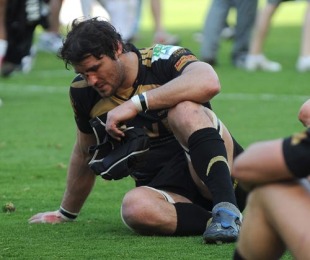|
Comment
Coming back brighter
Huw Richards
May 11, 2010

Marty Holah shows the Ospreys' disappointment at defeat to Biarritz
© Getty Images
Enlarge
The jury stays out - and may do so for years to come - but even those of us whose primary affections remain with clubs must accept that the past few weeks have been good for Wales' regional franchises. The Blues produced one of the best wins in their history, away to Wasps in the semi-final of the European Challenge Cup, and will go to Marseille later this month - an authentic lion's den given its proximity to opponents Toulon - guaranteed not only the support of their own fan base, but that of fans in Llanelli and points west who will bury the usual east-west grievances in pursuit of the Blues victory that will earn the Scarlets a Heineken place next season. The Ospreys did not progress in Europe, falling to Biarritz in the Heineken quarter-final. But that result was put into perspective by the manner in which Biarritz bullied Munster to defeat in the subsequent semi-final and also the style in which the Ospreys performed, producing the bulk of the creative rugby before going down narrowly. To see Ryan Jones, habitually articulate even in defeat, close to speechless with disappointment was to realise quite how much this meant to the Ospreys and the extent of their sense of loss. So all credit for what followed. Readers of this column will remember its scepticism last month about Ospreys' chances in a brutal all-Irish conclusion to their away Magners programme - that they'd get sufficient points from trips to Ulster, Leinster and Munster seemed unlikely even before the disappointment they suffered in San Sebastian. Ulster at least, in the same week, seemed a lost cause. That they won in Belfast, and later in Limerick, and grabbed a bonus point in Leinster, showed a degree of fortitude and commitment to be admired. It was also the sort of run of success in adversity that helps to build up the sense of identity whose absence I remarked upon last month. No, I still won't care as much as I did about the All Whites - but middle-aged rugby journos were never the main target market, and that run of form in Ireland means I'll look at the Magners League play-offs with rather more interest than I might previously have anticipated. Those playoffs certainly feel far more important and relevant than the international against South Africa on June 5. Few excuses for an extra fixture have been thinner than the 10th anniversary of the Millennium Stadium, not least because it is 11 years since Wales beat the Boks in their first match there. To celebrate this particular memory merely serves to remind us of how lousy Wales's overall record against South Africa is, while describing a 2.30 kick-off as recompense for the antisocial hours of recent Six Nations matches both looked a cynical warm-up for the announcement of yet another Friday night contest, against England next year, and rang pretty hollow in the absence of serious cuts in ticket prices. Much better to own up that the WRU still needs to fund the interest payments on the stadium and to stop trying to kid us that playing for the Prince William Cup adds meaning. "Yeah, right", as our New Zealand friends would put it. There was also a reminder of the days when Tests against the southern hemisphere giants meant much more, not least by virtue of scarcity, with the recent death of Gwyn Rowlands, further diminishing the number of Welshmen who have played in victories over the All Blacks. Rowlands, who was 81, played in the wins by Cardiff and Wales over the 1953 tourists. The Test was particularly memorable, as it was his debut, his 25th birthday and, as Wales's goal-kicker, he landed the penalty that levelled the scores with minutes to go, paving the way for Ken Jones's eventual winning try. Now only five of that Wales team - Stoker Williams, Courtenay Meredith, John Gwilliam, Cliff Morgan and Gareth Griffiths - remain. Rowlands is the third to die in little over a year following fullback Gerwyn Williams and captain Bleddyn Williams. Having interviewed 10 Welsh survivors when I wrote a book about that match some years ago, I remember them all with affection - but none more than Gwyn Rowlands. His memories were fresh and vivid, having been interviewed relatively little in the intervening years. He spoke not only of that memorable debut, but of the traumas of a few years before, when - eligible for England by birth and Wales by descent - he was picked for both trials and the fallout devastated his parents' marriage. To go at 81 after a full life containing such achievement is hardly a tragedy, but there is sadness nevertheless. © Scrum.com
|
Live Sports
Communication error please reload the page.
-
Football
-
Cricket
-
Rugby
-
- Days
- Hrs
- Mins
- Secs
F1 - Abu Dhabi GP
Abu Dhabi Grand Prix December 11-131. Max Verstappen ()
2. Valtteri Bottas (Mercedes)
3. Lewis Hamilton (Mercedes)
4. Alexander Albon ()
5. Lando Norris ()
6. Carlos Sainz Jr ()
-
ESPNOtherLive >>
Darts - Premier League
Golf - Houston Open
Snooker - China Open
Tennis - Miami Open

